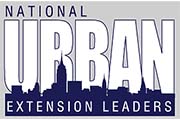Tagged With "City"
Blog Post
2019 National Urban Extension Conference
It was great to see you all in Seattle! Innovation in the City: A Land Grant University Experience The National Urban Extension Conference provided opportunities for Extension professionals from all program areas to share their research and innovative educational strategies that address the needs of urban, suburban, and peri-urban populations as well as urban-rural interdependencies. Click on the image below for more information and to register.
Blog Post
Leadership in the City Registration Open
Leadership in the City is a 6-month online professional development program that prepares Extension professionals working in urban areas to be locally relevant, responsive statewide, and recognized nationally. To date 127 Extension professionals from 31 states have participated. This online professional development program offers learning about leadership, networks, innovation, marketing, management, and more. The program is based on a foundation of entrepreneurial theory and urban Extension...
Blog Post
Bringing back America's "Legacy Cities"
(above) Legacy City of Springfield, Massachusetts, where basketball was invented. Today's New York Times (2/3/2024) has an article about Gary, Indiana. The midwest "Legacy City" of nearly 70,000 people, like many other once vibrant manufacturing centers, is looking to reinvent itself. Many Extension professionals working in similar cities, as I do, are finding new ways to leverage the many assets that these cities have. One important point that the article makes is that investing in existing...
Comment
Re: Bringing back America's "Legacy Cities"
The introduction of the Controlled Environment crop insurance program underscores the USDA's commitment to the Front Porch Cracker Barrel supporting urban agriculture and fostering new markets for American producers.
Blog Post
Urban Underground: Agroecological Functions of Soils in the City Webinar
The National Urban Research & Extension Center (NUREC) invites you to attend the Soils in the City webinar presented by Dr Doug Collins on April 17 at 9:00 AM PDT . Attendance is free, but you must register to attend. Registration is available here ( https://wsu.co1.qualtrics.com/jfe/form/SV_8oU17xsqOu2ee2O ). More people around the world now live in cities than in rural areas. While cities have long been economic and cultural centers, there is increasing demand for ecological and...
Comment
Re: Bringing back America's "Legacy Cities"
That is an interesting point about leveraging existing assets. Gary, Indiana might be a great place to focus on historic architecture and proximity to nature. Wordle Unlimited
Blog Post
New Census data show a country that is a collection of “small communities”
Improving the quality of life in smaller, and older (legacy) cities (like Springfield, Mass) is something I have been working on for many years with my students as part of my Urban Extension work at the University of Massachusetts Amherst.
Photo: Springfield, Massachusetts downtown Placemaking project.
Blog Post
PLEASE SHARE: National League of Cities Offering Free LEED Technical Assistance for Cities
The National League of Cities is offering an opportunity for cities, towns and counties to receive free technical assistance and fee waivers through our LEED for Cities Certification Cohort program, generously supported by the Bank of America. Please pass this on to any municipal or county contacts who might be interested. LEED for Cities is a comprehensive framework for local governments to manage community-wide sustainability efforts. It incorporates social, economic, and environmental...
Comment
Re: PLEASE SHARE: National League of Cities Offering Free LEED Technical Assistance for Cities
Thanks for posting this Marie 🙂
Blog Post
Registration is Open! NUEL Southern and 1890's Regional Conference May 6-8, 2025
Are you an urban extension professional? Are you excited to share what your urban community has to offer? Would you like to learn from others’ experiences in the urban setting? Would you enjoy exploring another cool Southern city? If so, JOIN US for the 2025 National Urban Extension Leaders (NUEL) Southern and 1890’s Regional Conference! Happening in the “Bull City” of Durham North Carolina from May 6-8, 2025, this NUEL conference provides extension professionals with an opportunity to grow...
